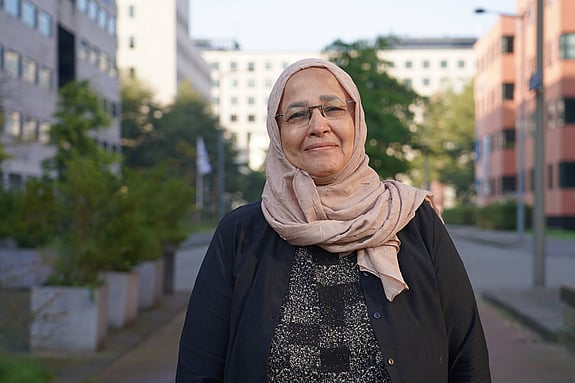“Women lead differently. That’s why we need more of them.”
As Secretary General of the Sudanese Red Crescent Society (SRCS), Aida Elsayed is leading through one of the most severe and underreported humanitarian crises in the world. For nearly four decades, she has worked on the frontlines of public health, disaster response, and conflict recovery — always with the people of Sudan at the heart of her mission.

Her journey with the Red Crescent began not in an office, but as a young girl walking alongside her aunt. “She’s the one who introduced me to the Movement. From a very young age, she would take me along whenever there were Red Crescent events or first aid activities. That’s when I first fell in love with the work of the Sudanese Red Crescent Society.” Aida officially joined the Movement in 1987 as a volunteer. By 1988, she became a staff member. “Since then, I’ve never looked back. The work is meaningful, inspiring, and deeply connected to people’s lives—once you’re part of it, it’s impossible to walk away.”
Her educational background, rooted in community development, shaped her approach to humanitarian work. “I graduated from Ahfad University for Women, and I found that everything I learned there came to life in my work with the Sudanese Red Crescent Society. The focus on community-based approaches resonated deeply with my education.” Soon, Aida was leading health programs across Sudan, becoming the first in her family to work away and travel extensively. “I broke away from the family tradition of staying close to home. I was the first to go out into the field, to travel across Sudan and beyond.” One experience from that period still resonates deeply with her: “The project that touched me most was the National Community Health Volunteers Program. I felt a deep sense of connection and purpose through it.”
That purpose became even more critical when conflict erupted in April 2023. Over 12 million people have since been forced from their homes, making Sudan the world’s largest internal displacement crises.
”Being a female leader in this field requires strength and resilience. It’s not easy—you constantly have to prove yourself.”
Aida and her team had to flee too. “We now live and work together with all the SRCS colleagues in one house in Port Sudan. It’s not easy. Every employee has a story. We’ve lost colleagues, houses, relatives in the past years. But we have become like a family.” Despite everything, SRCS continues to serve communities across Sudan through a network of 11,934 volunteers. “We’re the only organization with access across the entire country. Even with insecurity, even when transport costs have multiplied eightfold, and with the enormous needs for food, shelter, and medical care — we try to do what we can.”
One of her biggest concerns is the violence against women. “Women are the biggest victims in this conflict, as they face high risks of sexual violence. Already thousands have been raped.” In response, SRCS has opened safe spaces and psychosocial support centers. “We are doing our best to protect women. But the needs are overwhelming.”
This harsh reality is also a reminder of why female leadership matters — not just in times of peace, but especially in moments of deep crisis. Aida has seen this first-hand: “Communities respond positively when they see a woman in a leadership role. They feel more comfortable, especially during sensitive conversations. Women tend to be more approachable, particularly when engaging with other women or addressing personal issues. This trust is powerful — and it’s exactly why we need more female leaders in the Movement.”
Aida’s experience as a female leader in the humanitarian field has not always been smooth. In many places, especially in Sudan, it’s still not widely accepted for women to lead. “Being a female leader in this field requires strength and resilience. It’s not easy—you constantly have to prove yourself. At SRCS, I’m proud to say that I currently have two women serving as branch directors and many more women working at different levels.” But she knows that change doesn’t come overnight. “Yes, there have been positive changes, but the pace is still slow.”
”I hope that the next generation of women will step up—not just at the top, but in every corner of the Movement.”
“We are witnessing historic moments — both the IFRC and ICRC presidents are women, which is incredibly inspiring. Here in Addis Ababa, we see leaders like Dr. Asha and Ms. Paula making waves. This is a promising time, but we still need to go further — to empower more women, to give them the space and support to lead.” Because for Aida, empowering women is not just about equity — it’s about rebuilding the future of Sudan.
“I dream of peace in my country. I want to remind the world that there is a country called Sudan and the country is facing the biggest internal displacement crisis in the world. Please do not forget Sudan. Please help us bring back peace.”
In this new future for her country, Aida sees women at the forefront: “I dream of seeing more women rise to leadership. Women are patient, adaptable, and committed to serving their communities. I believe the legacy of women’s leadership at SRCS will continue long after I’ve stepped aside. I hope that the next generation of women will step up—not just at the top, but in every corner of the Movement.”
Aida Elsayed
